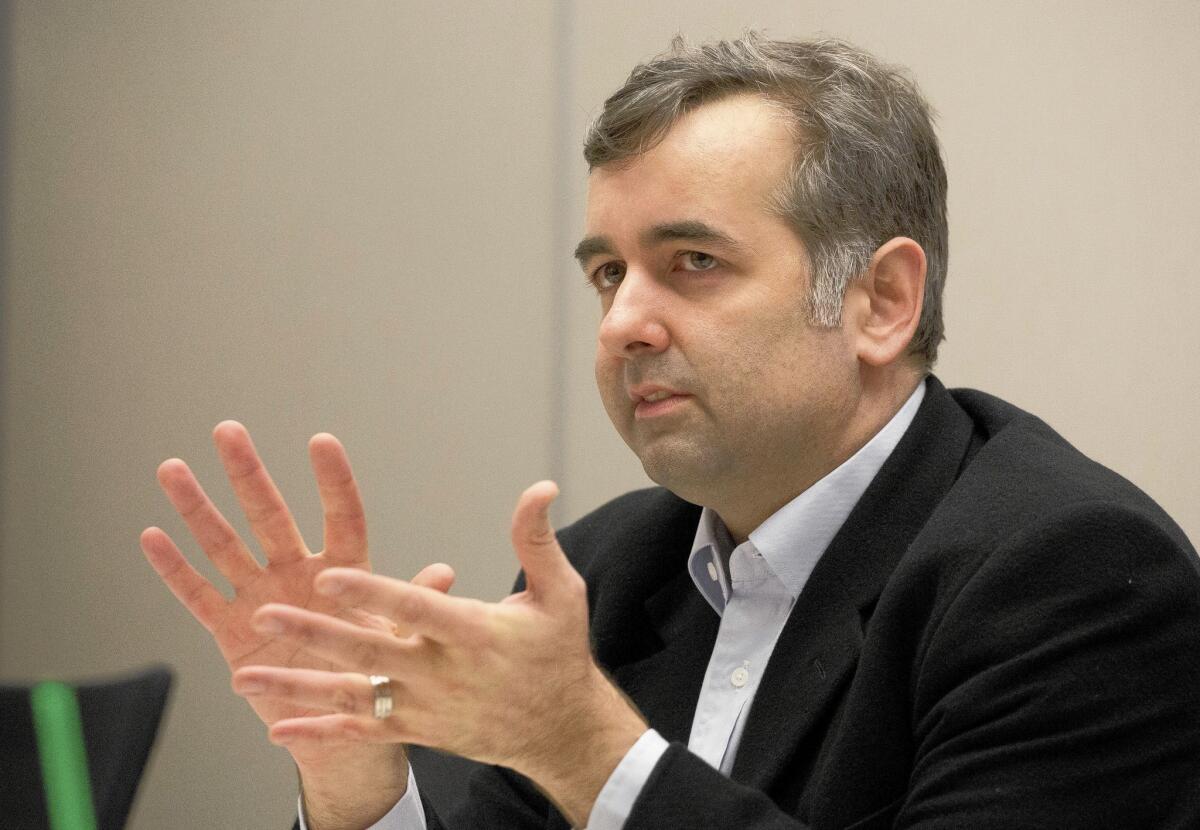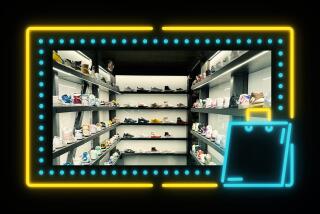Q&A: Etsy CEO Chad Dickerson on IPO prospects, comparisons to EBay

Thereâs a lot to browse on Etsy. Check out the $2.50 earrings made from the feathers of a âquail raised with loveâ on a Colorado farm. Or take a look at the $30,000 pub-style bar made to order from pine and cherry.
Unique products such as these are the reason Etsy Chief Executive Chad Dickerson calls the online marketplace âa personal shopping experience â really â in a sea of impersonal retail.â
Founded in 2005, the Brooklyn company is housed in the former home of Robert Gair Co., named after the 19th century inventor of corrugated cardboard.
The 500-employee start-up has been profitable since 2009. Etsy doesnât disclose its revenue figures, but Dickerson says the company is growing. Its vendors sold $1.35 billion worth of goods in 2013, up 51% from a year earlier.
The company recently announced a pricing policy for its wholesale market, which allows its artists and craft makers to sell directly to retailers including Nordstrom, West Elm and the Brooklyn Botanic Garden. Etsy takes a 3.5% fee for wholesale purchase orders, the same as its regular transaction rates.
Dickerson recently talked about Etsy, comparisons to EBay and its prospects for an initial public offering.
The conversation has been edited and condensed.
Question: Is there a typical Etsy seller, and has that changed over time?
Answer: Thereâs no one-size-fits-all for Etsy sellers. There are sellers in 200 countries around the world, so itâs very geographically diverse. We have everyone from college students to retirees. The one thing that we do hear is that Etsy sellers really enjoy Etsy because it gives them flexibility to work in their own terms.
Thereâs a woman who sells in Rockford, Ill., named Amy Michalek. Amy was like many, starting a family. She started doing this as a way to make money while she was taking care of her daughter. One of the things they make are neckties for babies â theyâre really cute. She started doing so well that she needed help. So she taught her husband how to sew. And her husband quit his job and now he makes more money than he made working at Auto Zone and theyâre both at home.
Q: When are you looking to do an initial public offering?
A: An IPO is a possible outcome for Etsy. We donât have any plans in the next year. Weâre focused on building a company. We do want to stay independent. We think itâs really important to continue to serve our community and we think independence really matters. Weâre not the traditional Silicon Valley type of company, where we just have this blood thirst to go public, but itâs definitely a possible outcome.
Q: Can you talk about the parallels with EBay?
A: We see ourselves as very different from EBay, and of course, people compare Etsy to EBay, but look at the type of goods sold on Etsy versus EBay. On EBay youâll find iPads, electronics, all sorts of things like that. Etsy is really a marketplace for makers and curators. A curator refers to our vintage category, which means anything thatâs 20 years old or older.
Q: Whatâs most difficult about running the company?
A: On a tactical level, weâre a company that depends heavily on technology, so we always have to have the talent we need to continue to build services on Etsy. So just continuing to build the talent, whether itâs engineering or marketing or finance or anything, is super challenging.
We are [also] doing business in a different way, so I spend a lot of time trying to break through conventional wisdom about business. Thereâs a dated view of business out there thatâs from the robber barons of the 1800s, and weâre in a world now where the Internet business can be really successful but also be really fair and support a community.
Q: Whatâs it like to attract engineers to New York? How do you feel about the crop of engineers you have here and are you able to recruit people here pretty easily?
A: Iâll never forget when I joined in 2008, I talked to a [chief technology officer] of a major Internet company, who had just left that company, and he came to visit me in New York. And we were facing a lot of technology problems at the time and he told me in the fall of 2008, âI donât think youâre ever going to be able to build a good engineering team in New York.â And to give some context, this is when the financial collapse was happening.
What I found, though, was that New York is easily the greatest city in the world. And many engineers, many technology folks, many design folks donât want to live in suburbs. They want to live in urban areas. They want to live in cities. So in that sense New York is more attractive than, say, Cupertino, Calif. Silicon Valley is great but itâs really very narrow in its focus.
Q: What have you bought on Etsy recently?
A: I bought the belt that Iâm wearing right now. I bought my computer bag. I bought cuff links ⌠two sets. One was old subway tokens, which is really cool. The other one was a seller who takes vintage maps and you send her the name of the cities that you want. She cuts out the little piece of the city. So I have Berkeley and Brooklyn because I lived in Berkeley and Brooklyn. We have an artist on Etsy who makes drones. So I bought a drone on Etsy but itâs not actually a working drone. Itâs more of an art piece.
More to Read
Inside the business of entertainment
The Wide Shot brings you news, analysis and insights on everything from streaming wars to production â and what it all means for the future.
You may occasionally receive promotional content from the Los Angeles Times.










